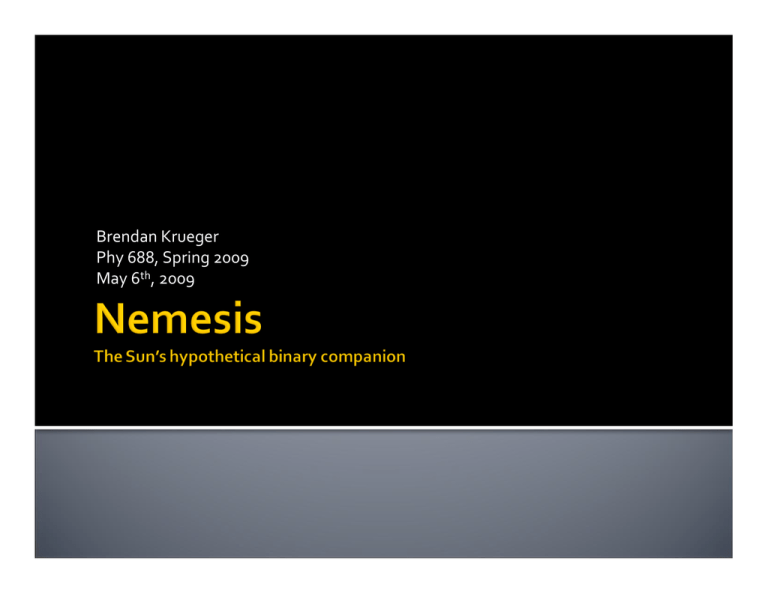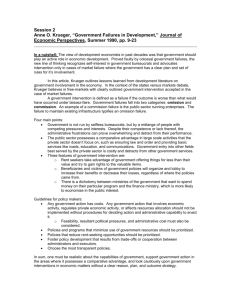Brendan Krueger Phy 688, Spring 2009 May 6 , 2009
advertisement

Brendan Krueger Phy 688, Spring 2009 May 6th, 2009 Development of the theory Alvarez hypothesis Periodicity of extinctions Proposal of a solar companion Orbit of Nemesis Proposed orbit Current location Stability Detection of Nemesis Why we haven’t seen it Pan‐STARRS LSST Alternate theory Oscillation through the galactic plane Nemesis, Brendan Krueger 2 The Alvarez hypothesis Periodicity of extinctions Proposal of a solar companion Nemesis, Brendan Krueger 3 Alvarez !"#$%&# (1980) Depletion of platinum metals (Ru, Rh, Pd, Os, Ir, Pt) on Earth Increased iridium coincident with Cretaceous‐ Tertiary extinction (K‐T Event) Massive asteroid impact Diameter: 10 ± 4 km Abundances suggest impactor origin is solar, but extraterrestrial Spread dust throughout atmosphere ▪ Extinction (block sunlight, etc.) ▪ Iridium‐rich layer in geologic record Nemesis, Brendan Krueger 4 Alvarez !"#$%&# (1980) Artist&s conception o- the /-T E3ent 4C6EE/-shoe-lube: (thus saith the Internets and phone calls to Mexico aren&t cheap) “Maybe an Asteroid '()*+"$Kill the Dinosaurs”, Jeffrey Kluger, TIME, 27 April, 2009 Nemesis, Brendan Krueger 5 Raup & Sepkoski (1984) Various periodic analysis techniques reveal spikes in the extinction record around every 30 Myr Best fit period evidenced a cycle of 26Myr Period‐folding the data displays a relatively sharp peak Discrete extinction events Nemesis, Brendan Krueger 6 Raup & Sepkoski (1984) Various periodic analysis techniques reveal spikes in the extinction record around every 30 Myr Best fit period evidenced a cycle of 26Myr Period‐folding the data displays a relatively sharp peak Discrete extinction events Nemesis, Brendan Krueger 7 Raup & Sepkoski (1984) Two events known to match impact events (K‐T Event and Late Eocene extinction) Length of cycle suggests extraterrestrial source Uncertainty in geologic time Nemesis, Brendan Krueger 8 Whitmire & Jackson (1984); Davis, Hut, Muller (1984) Propose a low‐mass solar companion Late K dwarf down to brown dwarf/planet limit (magnitude 7‐12) or black hole Highly eccentric Widely separated At perihelion the companion passes through the dense inner Oort cloud and scatters asteroids towards Earth Several dozen (within an order of magnitude) impacts on Earth over 1‐2 Myr) Nemesis, Brendan Krueger 9 Wikipedia Spherical shell of comets 10,000 AU – 100,000 AU Hills Cloud (aka Inner Oort Cloud): 100 AU – 3,000 AU Kuiper Belt: 30 AU – 55 AU Likely ejected from inner Solar System by giant planets Surrounds disc clouds Nemesis, Brendan Krueger 10 Whitmire & Jackson (1984); Davis, Hut, Muller (1984) “If and when the companion is found, we suggest it be named Nemesis, after the Greek goddess who relentlessly persecutes the excessively rich, proud and powerful. We worry that if the companion is not found, this paper will be our nemesis.” Davis, Hut, Muller (1984) Nemesis, Brendan Krueger 11 Proposed orbit Current location Stability Nemesis, Brendan Krueger 12 Whitmire & Jackson (1984); Davis, Hut, Muller (1984) Period of 26 Myr (roughly 10 cycles appear in the geologic record) Semimajor axis around 90,000 AU (1.4 light years) Eccentricity greater than 0.7 Perihelion at several thousand AU (Inner Oort Cloud) Prior to 400 Myr ago May have been more closely bound and less eccentric Interactions with other galactic bodies may have changed the orbit Nemesis, Brendan Krueger 13 Whitmire & Jackson (1984); Davis, Hut, Muller (1984) Last recorded extinction event: ~11 Myr ago Near aphelion; ~2.4 light years away: outer edge of Oort cloud Potentially in the direction of Hydra constellation Next perihelion passage of Nemesis: ~15,000,000 AD “That’s the take‐home message of the presentation: Start running around screaming because we’re all going to die.” ▪ Josh Schlieder Nemesis, Brendan Krueger 14 Nature, vol. 311 (October 18, 1984); muller.lbl.gov Very wide separation may not be stable Galactic tidal forces Stars Giant molecular clouds (GMCs) Statistical arguments suggest the orbit should be unstable Bailey’s “Nemesis for Nemesis?” editorial Minimum mass of 10MJ (Hills) Nemesis, Brendan Krueger 15 Nature, vol. 311 (October 18, 1984); muller.lbl.gov Monte Carlo analysis by Hut Most stable when aligned with galactic plane ▪ Likely unstable for ( > 30o ▪ Plane of solar system: ( = 60o Variation in perihelion ▪ Geologic record vs. theory Expected to survive for another ~1 Gyr May have started more closely bound Interaction ~400 Myr ago increased eccentricity Nemesis, Brendan Krueger 16 Why we haven’t seen it Pan‐STARRS LSST Nemesis, Brendan Krueger 17 various sources Estimated magnitude is between 7 and 12 Nearly all such objects catalogued Very few studied for proper motion or distance “The known stars nearest to the Sun have been discovered either because of their high apparent brightness, their large proper motion, or their association with other nearby stars. Unfortunately, our proposed companion star is likely to have none of these characteristics.” ▪ Davis, Hut, Muller (1984) Location unknown Based on analysis of long‐period comets: towards Hydra Roughly 3,000 primary candidates identified for study Nemesis, Brendan Krueger 18 Wikipedia Panoramic Survey Telescope And Rapid Response System Survey roughly 75% of the sky to magnitude 24 Telescopes Four 1.8m telescopes in Hawaii PS1: December 6th, 2008 Final three by 2012 Will identify stars with large parallax but small proper motion Mark for later radial velocity measurements Nemesis is believed to fall into this category Nemesis, Brendan Krueger 19 Wikipedia, LSST.org Large Synoptic Survey Telescope 8.4m ground‐based telescope, out to magnitude of 24‐27 Construction should begin 2010 First light expected 2014 200,000 images (1.28 petabytes) per year Will require advanced data mining to analyze Could be capable of identifying Nemesis Nemesis, Brendan Krueger 20 Oscillations through galactic plane Oscillation phase Nemesis, Brendan Krueger 21 various sources The Solar System oscillates vertically through the Milky Way Stars and GMCs are denser near the center of the galactic plane Rampino & Stothers quote periodicities as: Extinctions: 30 ± 1 Myr Galactic oscillations: 33 ± 3 Myr Nemesis, Brendan Krueger 22 various sources Current data estimating the position and timing of the galactic oscillation vs. extinction record Extinction events peak when the Earth is farthest from galactic plane Unknown how to resolve this Nemesis, Brendan Krueger 23 Summary References Questions Nemesis, Brendan Krueger 24 Apparent 26 Myr periodicity in extinction Distant solar companion proposed Likely a brown dwarf in a wide, eccentric orbit Scatters Oort Cloud objects into inner Solar system Various properties put it in an under‐studied class Pan‐STARRS & LSST should be able to find it Stability of orbit is in question Nemesis, Brendan Krueger 25 Alvarez !"$%&# (1980). ,-(!*-! BCD, 1095–1108. Bailey (1984). .%"/0! EFF, 602‐603. Bhalerao, Vahia (2005). 1/&&#$23"0#$,4-# 5*)(% EE, 27‐33. Bottke !"$%&# (2007). .%"/0! GGH, 48‐ 53. Burgasser (2007). 267 IJD, 617‐621. Clube, Napier (1984). .%"/0! EFF, 635‐ 636. Davis, Hut, Muller (1984). .%"/0! ECD, 715‐717. Hills (1984). .%"/0! EFF, 636‐638. Hut (1984). .%"/0! EFF, 638‐641. Kluger (2009). 859:, “Maybe an Asteroid '()*+"$Kill the Dinosaurs.” Muller (2002). ;!4&#$,4-#$$2<#$,6!-# =%6# 356. Muller. http://muller.lbl.gov/pages/lbl‐ nem.htm. Accessed 07 April 2009. Rampino, Stothers (1984). .%"/0! ECD, 709‐712. Nemesis, Brendan Krueger Raup, Sepkoski (1984). =04-#$.%"&# 2-%)#$,-(#$>,2 DF, 801‐805. Reddy et al. (2008). Asteroids, Comets, Meteors; Baltimore, Maryland, USA. Schwartz, James (1984). .%"/0! ECD, 712‐713. Torbett, Smoluchowski (1984). .%"/0! EFF, 641‐642. Whitmire, Jackson (1984). .%"/0! ECD, 713‐715. Wikipedia: 2&?%0!@$AB64"A!3(3. Wikipedia: C,,8. Large Synoptic Survey Telescope. http://www.lsst.org. Wikipedia: =%*D,82EE,. Pan‐STARRS. http://pan‐ starrs.ifa.hawaii.edu. Wikipedia: .!<!3(3$F3"%0G. Wikipedia: H40"$-&4/). 26




